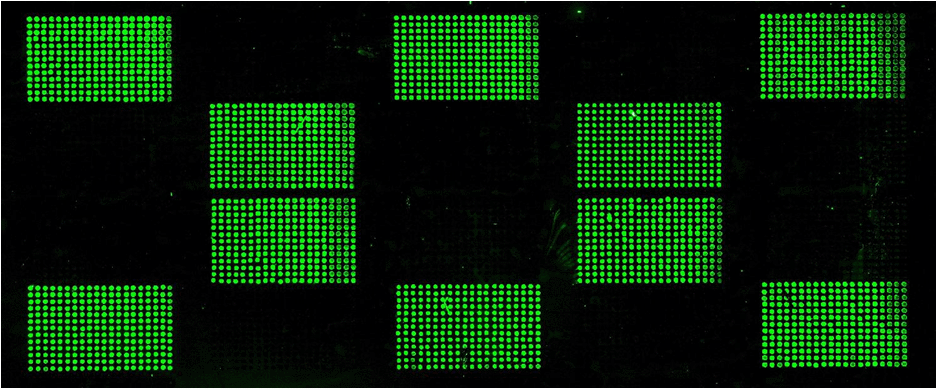|
|

|
NSF
DBI-0501914:
Self-Assembling Autofluorescent Protein Microarrays, a Universal Resource
for the Plant Research Community
|
Investigators:
David W. Galbraith, University
of Arizona (galbraith@arizona.edu)
David Gang, University of
Arizona (gang@ag.arizona.edu)
Serrine Lau, University of
Arizona (lau@pharmacy.arizona.edu)
Postdoctoral Associates,
Technical Staff, and
Graduate and Undergraduate Students:
Dr. Xristo Zarate (Galbraith
laboratory)
Dr. David Henderson (Galbraith
laboratory)
Mr. Mike Galligan (Lau
laboratory)
Dr. Barbara Leinweber (Lau
laboratory)
Dr. Jeremy Kapteyn (Gang
laboratory)
Mr. Zhengzhi Xie (Gang laboratory)
Mr. Mike Kimzey (Galbraith/Lau
laboratories)
Ms. April Lake (Galbraith
laboratory)
Mr. Keenan Phillips (Galbraith
laboratory)
Project Objectives:
The project comprises a series of proof-of-concept experiments primarily
using Arabidopsis thaliana and Zea mays as the experimental
organisms. The project is based on the recent description, which we have
implemented in our laboratories, of the production of protein microarrays via
a process of in situ biosynthesis. This involves spotting onto
microscope slides different recombinant DNA constructions encoding the
proteins of interest fused to an epitope tag. Mixed with the DNA, and spotted
at the same time, is an antibody directed against the epitope. After spotting
and immobilizing the mixed DNA/antibody mixture, the microarrays are covered
in transcription/translation mix, which produces epitope-tagged proteins from
the information encoded in the DNA molecules, which are then captured by the
immobilized anti-epitope antibodies. The resultant protein microarrays will
then employed for a variety of novel downstream assays, which we have devised
to examine protein-protein interactions, protein-DNA interactions, covalent
modification of protein elements, and mass-spectrometric characterization of
the protein elements. These assays will be validated by judicious choice of
positive and negative controls, and will be extended to address specific
biological questions of interest to the community thereby informing the
community of the availability and power of these techniques.
Expected Outcomes:
The expected outcomes of this project are three-fold: a molecular
toolkit (reagents, recombinant DNA molecules, protein-encoding microarrays),
the associated descriptions of how to use this toolkit for examination of
protein interactions in vitro, and the results of the experiments that have
been done to validate the methodology. All outcomes will be freely
disseminated to the scientific community in a timely manner. The molecular
toolkits will be provided to interested individuals on request. The
descriptions of the methods and the results from the experiments will be
posted to the project website and, as appropriate, will be published in the
scientific literature. The methods are designed to be entirely general
in scope, and should be transferable to other eukaryotic organisms, including
those of other than the plant kingdom.
Acknowledgement and
Disclaimer:
This material is based upon work supported by the NSF Plant Genome
Program. Any opinions, findings, and conclusions or recommendations expressed
in this material are those of the author(s) and do not necessarily reflect
the views of the National Science Foundation.
Questions
or comments should be addressed to:David
Galbraith
Page last
updated June 26, 2008
|
